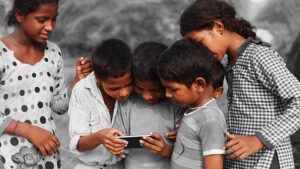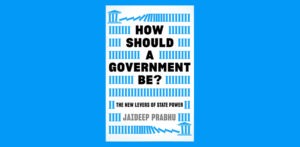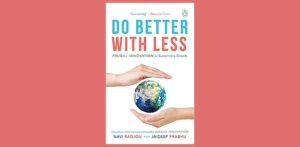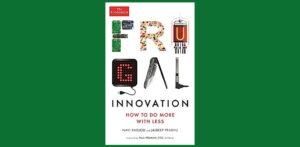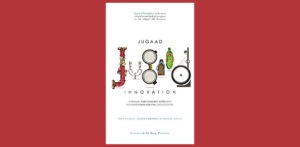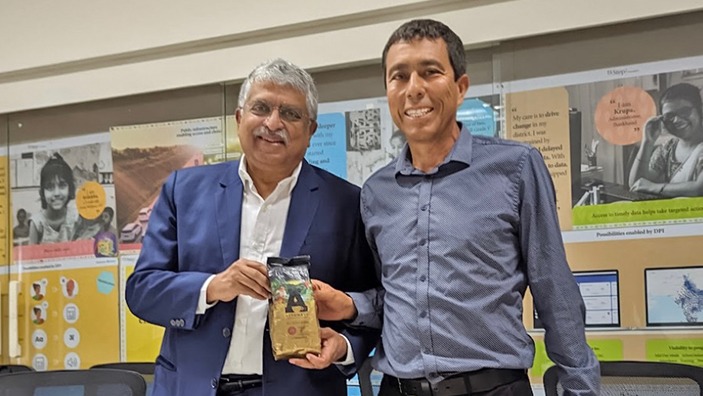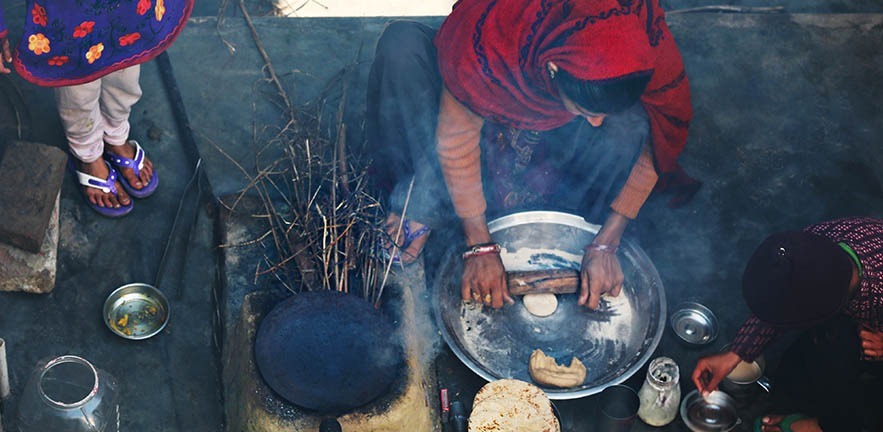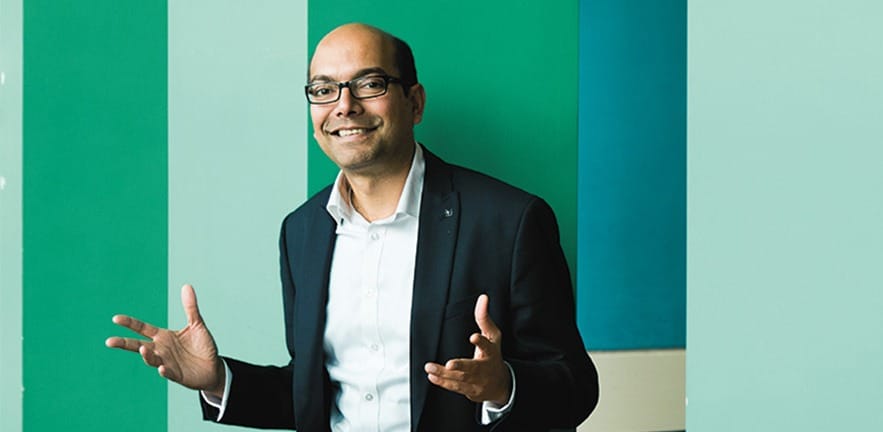Featured publications
Journal articles
2023
Prabhu, J.C., Vassallo, J.P. and Banerjee, S. (2023) “Biocultural innovation: innovating at the intersection of the biosphere and ethnosphere.” Journal of Product Innovation Management (forthcoming)
Vassallo, J.P., Banerjee, S., Zaman, H. and Prabhu, J.C. (2023) “Design thinking and public sector innovation: the divergent effects of risk-taking, cognitive empathy and emotional empathy on individual performance.” Research Policy (forthcoming)
Hassan, M., Prabhu, J., Chandy, R. and Narasimhan, O. (2023) “When bulldozers loom: informal property rights and marketing practice innovation among emerging market micro-entrepreneurs.” Marketing Science, 42(1): 137-165 (DOI: 10.1287/mksc.2022.1379)
2020
Agarwal, N., Chakrabarti, R., Prabhu, J. and Brem, A. (2020) “Managing dilemmas of resource mobilization through jugaad: a multi-method study of social enterprises in Indian healthcare.” Strategic Entrepreneurship Journal, 14(3): 419-443 (DOI: 10.1002/sej.1362)
Bhatti, Y., Prabhu, J. and Harris, M. (2020) “Frugal innovation for today’s and tomorrow’s crises.” Stanford Social Innovation Review, 23 June 2020
Jachimowicz, J.M., Szaszi, B., Lukas, M., Smerdon, D., Prabhu, J. and Weber, E.U. (2020) “Higher economic inequality intensifies the financial hardship of people living in poverty by fraying the community buffer.” Nature Human Behaviour, 4(Jul): 702–712 (DOI: 10.1038/s41562-020-0849-2)
Sunikka-Blank, M., Bardhan, R., Schupp, J., Prabhu, J. and Penz, F. (2020) “Films as source of everyday life and energy use: a case of Indian cinema.” Energy Research and Social Science, 69: 101655 (DOI: 10.1016/j.erss.2020.101655)
2019
Molner, S., Prabhu, J.C. and Yadav, M.S. (2019) “Lost in a universe of markets: toward a theory of market scoping for early-stage technologies.” Journal of Marketing, 83(2): 37-61 (DOI: 10.1177/0022242918813308)
Vassallo, J.P., Prabhu, J.C., Banerjee, S. and Voola, R. (2019) “The role of hybrid organizations in scaling social innovations in bottom-of-the-pyramid markets: insights from microfinance in India.” Journal of Product Innovation Management, 36(6): 744-763 (DOI: 10.1111/jpim.12504)
2017
Jachimowicz, J.M., Chafika, S., Munrat, S., Prabhu, J.C. and Weber, E.U. (2017) “Community trust reduces myopic decisions of low-income individuals.” Proceedings of the National Academy of Sciences (PNAS) 114(21): 5401–5406 (DOI: 10.1073/pnas.1617395114)
Kor, Y.Y., Prabhu, J. and Esposito, M. (2017) “How large food retailers can help solve the food waste crisis.” Harvard Business Review, 19 December 2017
Prabhu, J. (2017) “Frugal innovation: doing more with less for more.” Philosophical Transactions A, 375(2095): 20160372 (DOI: 10.1098/rsta.2016.0372)
Prabhu, J., Tracey, P. and Hassan, M. (2017) “Marketing to the poor: an institutional model of exchange in emerging markets.” AMS Review, 7(3-4): 101–122 (DOI: 10.1007/s13162-017-0100-0)
2016
Bocken, N.M.P., Fil, A. and Prabhu, J. (2016) “Scaling up social businesses in developing markets.” Journal of Cleaner Production, 139: 295-308 (DOI: 10.1016/j.jclepro.2016.08.045)
2015
Banerjee, S., Prabhu, J.C. and Chandy, R.K. (2015) “Indirect learning: how emerging-market firms grow in developed markets.” Journal of Marketing, 79(1): 1-28 (DOI: 10.1509/jm.12.0328)
Barrett, M., Davidson, E., Prabhu, J. and Vargo, S. (2015) “Service innovation in the digital age: key contributions and future directions.” MIS Quarterly, 39(1): 135-154
Ernst, H., Kahle, H.N., Dubiel, A., Prabhu, J. and Subramaniam, M. (2015) “The antecedents and consequences of affordable value innovations for emerging markets.” Journal of Product Innovation Management, 32(1): 65-79 (DOI: 10.1111/jpim.12171)
Prabhu, J. and Hain, S. (2015) “Innovation and entrepreneurship in India: understanding jugaad.” Asia Pacific Journal of Management, 32(4): 843-868 (DOI: 10.1007/s10490-015-9445-9)
2014
Chandra Balodi, K. and Prabhu, J. (2014) “Causal recipes for high performance: an exploratory comparative study of young high-technology firms from India and the UK.” International Journal of Entrepreneurial Behavior and Research, 20(6): 542-561 (DOI: 10.1108/IJEBR-10-2013-0168)
2013
Kahle, H.N., Dubiel, A., Ernst, H. and Prabhu, J. (2013) “The democratizing effects of frugal innovation: implications for inclusive growth and state-building.” Journal of Indian Business Research, 5(4): 220-234 (DOI: 10.1108/JIBR-01-2013-0008)
2012
George, G., McGahan, A.M. and Prabhu, J. (2012) “Innovation for inclusive growth: towards a theoretical framework and a research agenda.” Journal of Management Studies, 49(4): 661-683 (DOI: 10.1111/j.1467-6486.2012.01048.x)
Radjou, N. and Prabhu, J. (2012) “Mobilizing for growth in emerging markets: to reach the “next billion” consumers, multinational companies will need to move beyond value chain localization and create new networks of local partners.” MIT Sloan Management Review, 53(3): 81-88
2011
Mukherji, P., Sorescu, A., Prabhu, J.C. and Chandy, R.K. (2011) “Behemoths at the gate: how incumbents take on acquisitive entrants (and why some do better than others).” Journal of Marketing, 75(5): 53-70 (DOI: 10.1509/jmkg.75.5.53)
2009
Tellis, G.J., Prabhu, J.C. and Chandy, R.K. (2009) “Radical innovation across nations: the preeminence of corporate culture.” Journal of Marketing, 73(1): 3-23 (DOI: 10.1509/jmkg.73.1.3)
2008
Rao, R.S., Chandy, R.K. and Prabhu, J.C. (2008) “The fruits of legitimacy: why some new ventures gain more from innovation than others.” Journal of Marketing, 72(4): 58-75 (DOI: 10.1509/jmkg.72.4.58)
2007
Sorescu, A.B., Chandy, R.K. and Prabhu, J.C. (2007) “Why some acquisitions do better than others: product capital as a driver of long-term stock returns.” Journal of Marketing Research, 44(1): 57-72 (DOI: 10.1509/jmkr.44.1.57)
Yadav, M.S., Prabhu, J.C. and Chandy, R.K. (2007) “Managing the future: CEO attention and innovation outcomes.” Journal of Marketing, 71(4): 84-101 (DOI: 10.1509/jmkg.71.4.84)
2006
Chandy, R., Hopstaken, B., Narasimhan, O. and Prabhu, J. (2006) “From invention to innovation: conversion ability in product development.” Journal of Marketing Research, 43(3): 494-508 (DOI: 10.1509/jmkr.43.3.494)
2000-2005
Dellaert, B.G.C., Golounov, V.Y. and Prabhu, J. (2005) “The impact of price disclosure on dynamic shopping decisions.” Marketing Letters, 16(1): 37-52 (DOI: 10.1007/s11002-005-0719-8)
Prabhu, J.C., Chandy, R.K. and Ellis, M.E. (2005) “Acquisition and innovation in high-tech firms: poison pill, placebo, or tonic?” Journal of Marketing, 69(1): 114-130 (DOI: 10.1509/jmkg.69.1.114.55514)
Chandy, R.K., Prabhu, J.C. and Antia, K.D. (2003) “What will the future bring? Dominance, technology expectations, and radical product innovation.” Journal of Marketing, 67(3): 1-19 (DOI: 10.1509/jmkg.67.3.1.18652)
Frambach, R.T., Prabhu, J. and Verhallen, T.M.M. (2003) “The influence of business strategy on new product activity: the role of market orientation.” International Journal of Research in Marketing, 20(4): 377-397 (DOI: 10.1016/j.ijresmar.2003.03.003)
Ranaweera, C. and Prabhu, J. (2003) “The influence of satisfaction, trust and switching barriers on customer retention in a continuous purchasing setting.” International Journal of Service Industry Management, 14(4): 374-395 (DOI: 10.1108/09564230310489231)
Ranaweera, C. and Prabhu, J. (2003) “On the relative importance of customer satisfaction and trust as determinants of customer retention and positive word of mouth.” Journal of Targeting, Measurement and Analysis for Marketing, 12(1): 82-90 (DOI: 10.1057/palgrave.jt.5740100)
Sorescu, A.B., Chandy, R.K. and Prabhu, J.C. (2003) “Sources and financial consequences of radical innovation: insights from pharmaceuticals.” Journal of Marketing, 67(4): 82-102 (DOI: 10.1509/jmkg.67.4.82.18687)
Prabhu, J. and Stewart, D.W. (2001) “Signaling strategies in competitive interaction: building reputations and hiding the truth.” Journal of Marketing Research, 38(1): 62-73 (DOI: 10.1509/jmkr.38.1.62.18826)
Prabhu, J. and Tellis, G.J. (2000) “Do consumers ever learn? Analysis of segment behavior in experimental markets.” Journal of Behavioral Decision Making, 13(1): 19-34
Videos and podcasts
How should a government be? The new levers of state power
Centre for Science and Policy website, 4 March 2021
Jugaad innovation
TedX Talks, 4 September 2013
Jugaad innovation
Cambridge Judge Business School, 27 February 2012
What is innovation?
Reed Learning, 15 April 2016
Frugal innovation
Meaning Conference, 3 December 2015
A future without sufficient climate money
Spotify, November 2022
News and insight
Research centre news
Why India’s digital infrastructure is a blueprint for prosperity
A new Playbook from Cambridge Judge Business School on how developing economies can use digital infrastructure aims to provide a model for countries around the world.
Research centre news
Exploring Bengaluru’s digital innovators changing India and beyond
Carlos Montes (Lead – Cambridge Innovation Hub for Prosperity), Centre for India and Global Business, writes about a visit to India's Silicon Valley to explore think tanks set up by Nandan Nilekani of Infosys.
Governance, economics and policy
How to bridge the gap between government and private sector
A new Brokering Trust to Accelerate Innovation framework developed at Cambridge Judge Business School helps launch development projects through an honest broker.
Each of our research centres has unique ways to engage with non-academic organisations and, through that, to generate real world impact. This month we decided to share with you the work of the Centre for India & Global Business at Cambridge Judge Business School (CJBS).
Misc news
For the people
New book by Professor Jaideep Prabhu of Cambridge Judge Business School – How Should a Government Be? – outlines the state's role in the 21st Century.
Using Bollywood films to examine energy and household appliance use across four decades in India. Energy studies are often highly technical. A new study from the University of Cambridge takes a far more colourful approach, using 19 Indian feature films to document household energy and appliance use. "Bollywood isn’t usually associated with energy research, but this study takes a very novel approach to study social science through film," says co-author Jaideep Prabhu, Professor of Marketing and Director of the Centre for India & Global Business at Cambridge Judge Business School. "While the narrative of feature films is made up, the sets, especially in the so-called 'parallel cinema', are often very careful recreations of how things looked and people behaved at a particular point in time. By applying computer-based text and visual processing tools we can mine these films for the secrets they hold. The study shows how much insight into human behaviour we can get from a seemingly non-obvious source of data and analysis." The study by academics at the Department of Architecture and Cambridge Judge Business School at the University of Cambridge is published in the November 2020 issue of the journal Energy Research & Social Sciences. The research…
Insight
Quicker response in a crisis
"Frugal innovation" can help governments respond better to the COVID-19 pandemic, says article co-authored by Professor Jaideep Prabhu in Stanford Social Innovation Review. The concept of "frugal innovation" can help governments and civil society organisations around the world respond better to the spread of COVID-19 (coronavirus), says an article co-authored by Professor Jaideep Prabhu of Cambridge Judge Business School published in the Stanford Social Innovation Review. The frugal innovation responses so far have been based on four underlying principles: "reuse, repurpose, recombine, and, informing all of the others, rapidity", the article says. Regarding reuse, it was recently announced that the common and inexpensive steroid dexamethasone, in use since the 1960s, has been found effective in treating COVID-19. Another example: owing to the shortage of personal protective equipment, people have found creative ways to manufacture masks and shields using hole punchers and other common household devices. On repurposing, or altering current valuable research for a new purpose, Indian and Pakistani railways have turned underused trains into intensive care wards, while around the world ski goggles have been converted to safety glasses. An example of recombining or the mixing of resources is the construction of hospitals in a very short time using…
Video thoughts of participants of the inaugural edition of InnoFrugal UK, the UK’s first conference dedicated to the subject of frugal innovation and the circular economy. The inaugural edition of InnoFrugal UK, the UK’s first conference dedicated to the topic of Frugal Innovation, was hosted by Cambridge Judge Business School on 27 March 2018. The Business School partnered with Ignitho Technologies and The Nordic Frugal Innovation Society to present the event. The conference, which built on earlier successful editions of the event in Nordic countries, included presentations by Jaideep Prabhu, Professor of Marketing at Cambridge Judge; Dr Khaled Soufani, Director of the Circular Economy Centre at Cambridge Judge; and Eben Upton (EMBA 2009), Founder and CEO of micro-computer maker Raspberry Pi. During the conference, we asked some participants to share their thoughts about the conference, frugal innovation and circular economy principles. Watch the videos Amanda Calvert, Founder of Quince Consultancy and member of the Cambridge Judge Advisory Board talks about the conference and circular economy principles. Melissa Simonetto, a masters student from the Department of Engineering at the University of Cambridge, gives her thoughts on the InnoFrugal UK conference. Andy Clifton, Sustainability Manager – Engineering & Design at Rolls Royce,…
Insight
Frugal innovation
Professor Jaideep Prabhu says that doing more with less makes sense – whatever your location. On 26 January 2001, an earthquake of magnitude 7.9 hit Gujarat, India, killing over 25,000 people. Mansukhbhai Prajapati, a rural potter, escaped with his life but lost all his stock. All around him were people like him, coping with devastating loss and enormous practical problems. So he set out to help them in his way: he designed a fridge that would keep food fresh without electricity, using the only resource available to him – the clay with which he made pots. One of Prajapati’s small, squat fridges – the Mitti Cool – sits in the corner of Professor Jaideep Prabhu’s high-ceilinged, light-filled office at the Cambridge Judge Business School. No wires run out of the back: fill the top with water and it keeps the contents cool by the natural process of evaporation. The fridge is a superb example of the concept the Jawaharlal Nehru Professor of Indian Business and Enterprise highlights in his book Jugaad Innovation: Think Frugal, Be Flexible, Generate Breakthrough Growth (co-authored with Navi Radjou and Simone Ahuja). Jugaad, a Hindi word, is the art of overcoming harsh constraints by improvising an…
Read all Centre for India and Global Business news and insight


